So you’re wanting to commit to a plant-based diet for gut health, but you’re feeling miserable. You arrived here after asking, “How long does it take for your gut to adjust to a plant-based diet?”
Let’s explore this.
Plant-Based Journey
When I first started on my gut healing journey, plant foods were not part of the equation.
In fact, “Can you heal your gut with a plant-based foods diet?” were not words I never thought I’d write or a topic I ever thought I’d be interested in exploring.
Until Facebook.
Stupid Facebook. (I know you feel me on this one!)
My goal on this gut-healing journey and optimal wellness is and always has been to be super transparent with you. I’m not here to shill people, products, and brands for anything or anyone.
I’m here to help YOU and help myself because a healthy gut microbiota leads to a happy life.
I know this for sure because I have lived it, and I do live with it, daily.
I will forever be striving for achieving happy gut microbes (and ensuring you do the same).
Meat
Before I dig into all things plants, I need to start this conversation with meat so you have the full context.
I swear by the GAPS Diet. It changed my life in 2009, and I will forever be grateful and indebted to it.
Most people (even people who really know me) assume that I do – and always have – followed a vegan diet. False. Completely false.
There was never a day in my life when I was Vegan, and especially not from 2009 on, when I dug in to intense gut healing through the GAPS Diet.
My mind told me I wanted to thrive on grains, fruits, and vegetables, but my body screamed otherwise. It was a horrible battled I fought tooth and nail with on the daily.
So instead of fighting the good fight, I learned the art of listening to my body, and healed in major ways.
And, in fact, it’s the basis for A Gutsy Girl’s Bible: a 21-day approach to healing the gut.
So I stand by it 1,000%. I did then, I do today, and I always will.
Over the past couple years, though, I started to believe that you must live life while simultaneously having weird meat aversions. Ugh. (Literally, FML is what I’ve been constantly thinking since I know what was working for me personally.)
Enter Facebook
And then something really weird happened one day.
I was scrolling through Facebook one night (my first mistake) and someone shared this awful video of a dog tied up and a man beating it.
My heart broke into a million pieces. I was – literally – fixated on it for an entire week. And had I not scrolled on past, I would have immediately removed the person who shared it from my feed.
Just why?
But all the sudden, my mind went from the dog to eating meat from other animals, and I felt a bizarre sickness.
I sat with that for an entire week, while not eating any meat, to try to understand why and where it was coming from.
And then I arrived at my answer.
It had been months since I knew exactly where my meat was coming from. I was eating meat to eat it, but I had no idea why because long before this the aversions started.
In those moments, I realized that I didn’t want to live on meat autopilot anymore.
Instead, I wanted to learn more and find out where and how to go from here…..namely, could I continue seeing positive changes with my gut microbiome by consuming more plant-based meals?
What is Plant-Based Eating?
There are several ways to approach a plant-based diet.
These ways, quite honestly, depend on who you ask. At their core, though, it will be some version of a ‘Vegetarian diet.’
Here are several ways to approach the Vegetarian diet according to the Global Healing Center,
- A semi-vegetarian will eat some meat, but attempt to avoid it as much as possible. In the order of importance, red meat is particularly avoided in favor of poultry or fish.
- A pesco-vegetarian will eat fish, but not red meat or poultry.
- A pollo-vegetarian will eat poultry, but will avoid meat and fish.
- A lactoovo-vegetarian will avoid meat, poultry, and fish, but will eat dairy products and eggs. Most insist on eating only free-range eggs and believe hen farming is an inhumane practice that should not be economically supported.
- A lacto-vegetarian will consume dairy products, but not eggs.
- A full-vegetarian will avoid all meat, poultry, and fish. Additionally, he or she will avoid eating products such as gelatin or marshmallows that are made from animal byproducts.
- A very strict form of vegetarianism is known as the vegan lifestyle. Vegans avoid eating or using any kind of animal product, dairy products, eggs, processed foods made with animal derivatives, and clothing made from animal hide. Vegans also avoid using products that have been tested on animals for commercial or medical purposes.
For me personally, I am talking about a combination of semi-vegetarian and pesco-vegetarian.
You can take it however you wish. And, despite the fact that staunch Vegans will tell you there is only one way, it’s not true.
There is never only one way.
What You do NOT Consume on a Plant-Based Diet
However, if you are wanting to approach a more Vegetarian lifestyle, it’s not only about the meat.
In addition to reducing the amount of animal products, a plant-based diet typically also completely eliminates or drastically reduces things like:
- Fast food
- Desserts and sweetened beverages
- Refined grains: white rice, white bread, refined pasta, etc.
- Packaged foods: cookies, chips, sugary cereals, etc.
- Processed meats: bacon, sausage, etc.
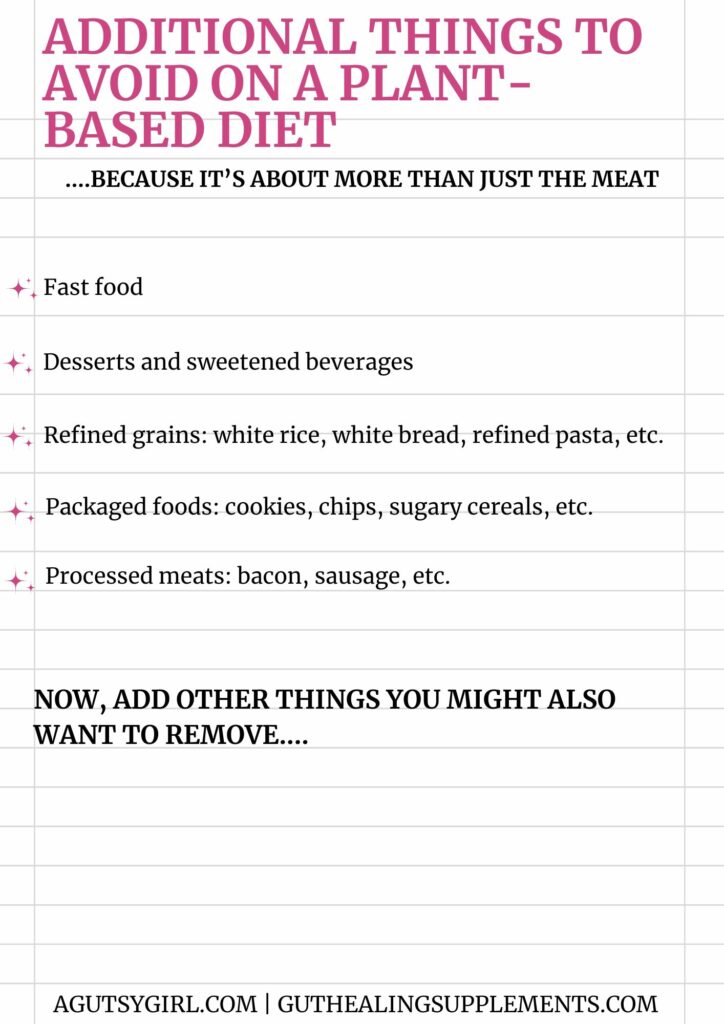
By following more of a plant-based diet, it does not mean you have to completely give up all animal-based foods; it simply means that the majority of the diet is comprised of plant-based options.
This is more about health and balance than following some sort of rigid protocol (which, by the way I don’t believe is conducive for overall human health in the first place).
Anyways….
Benefits of a Plant-Based Lifestyle
Before I dug in to testing this way of eating and living, I wanted to understand the benefits of it.
In case you, too, are wondering, here are 6 benefits of a plant-based diet:
- The possibility of reducing the number of medications one takes to treat a variety of chronic conditions
- Can lower body weight (aka help with weight loss if you need it)
- Might decrease the risk of cancer (see also number 5)
- Supports the immune system, since you’re likely seeing a significant increase in essential nutrients
- An increase in fiber-rich foods, which helps to provide bulk with bowel movements. (Note: This is especially true for your risk for the third most common cancer: colorectal cancer.)
- Lowering risk of developing coronary heart disease, high blood pressure, diabetes, and increased longevity
How Long Does it Take for Your Gut to Adjust to a Plant-Based Diet
Click HERE to save this article on ‘how long does it take for your gut to adjust to a plant-based diet’ for later.
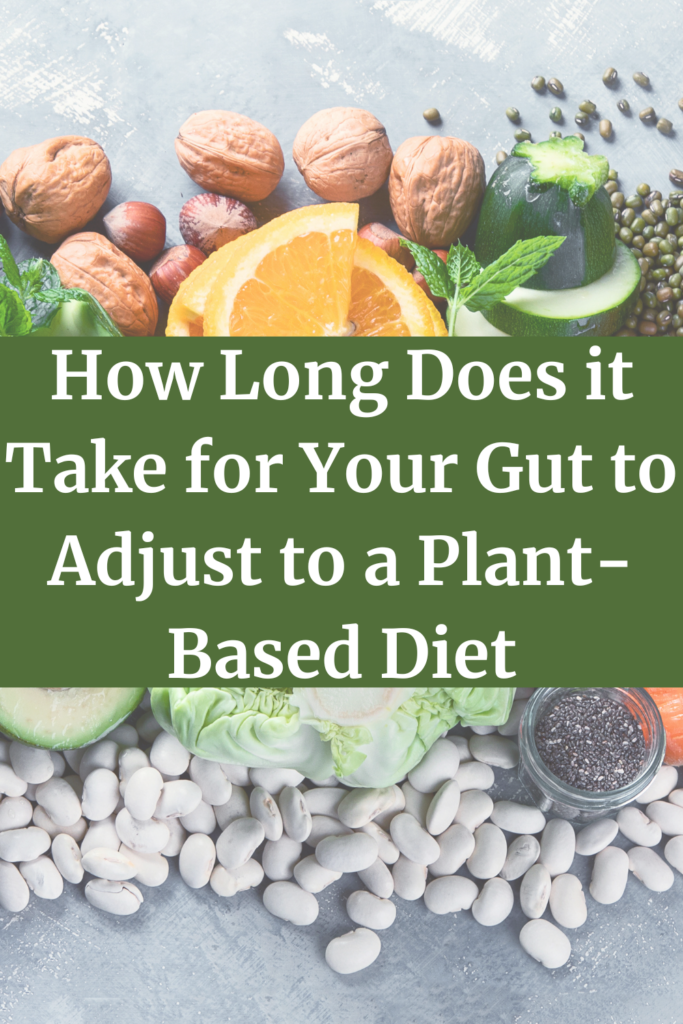
Like every other way to approach digestive issues with a new diet, just because you adopt a plant-based diet, doesn’t mean it won’t come without trial-and-error and an adjustment period.
Especially if you have been living mostly on animal protein and/or the Standard American Diet for any length of time, this will require some getting used to.
In the beginning, your digestive system could feel more gas and bloating. Side note: a high-quality digestive enzyme will be your best friend in this case.
The main reasons I have found for this include:
- An increase in dietary fiber
- Dietary changes that are also causing gut bacteria changes
- An undiagnosed condition (like SIBO, small intestine bacterial overgrowth) that might not be conducive for an uptick in fiber intake
If the main reasons for the excess gas, bloating, and constipation are due to numbers 1 and 2, you can expect these symptoms to resolve in anywhere from a couple of weeks to 30 days.
But during this time, also know that significant changes by way of positive health benefits are also occurring.
To alleviate these symptoms, incorporate the higher-fiber foods at a slower rate. You don’t need to (nor should you likely) go from 0g of fiber per day to 30+ grams.
Remember, though, just because you feel symptoms doesn’t mean you aren’t still healing.
Alternatively, just because you aren’t experiencing symptoms doesn’t mean you are healed.
Look at symptoms that also reside outside the gut.
These include things like:
Neurologic & Skeletal Symptoms
- Migraine or headaches
- Joint pains or aches
- Brain fog
Hormonal & Immune Symptoms
- Depression or anxiety
- Ongoing fatigue
- Chronic eczema or acne
However, if the main reason IS, in fact, SIBO, then that’s an entirely different conversation. The good news is that you can still adopt a plant-based lifestyle, but you’ll have to be more intentional with it.
Here are some resources for starting to transition to more plant-based foods with SIBO:
- Top 15 Low-FODMAP High-Fiber Foods
- Soluble vs Insoluble Fiber
- Is Fiber Helping or Hurting Me?
- Reasonable SIBO

In this post I have mentioned: A Gutsy Girl’s Bible, Reasonable SIBO, and the gut healing journaling SYSTEM. You’ll get ALL of those (+ more!!!) with my Master Gut Healing Resources to help drastically change the state of your gut health.
Can You Heal Your Gut on a Vegetarian Diet?
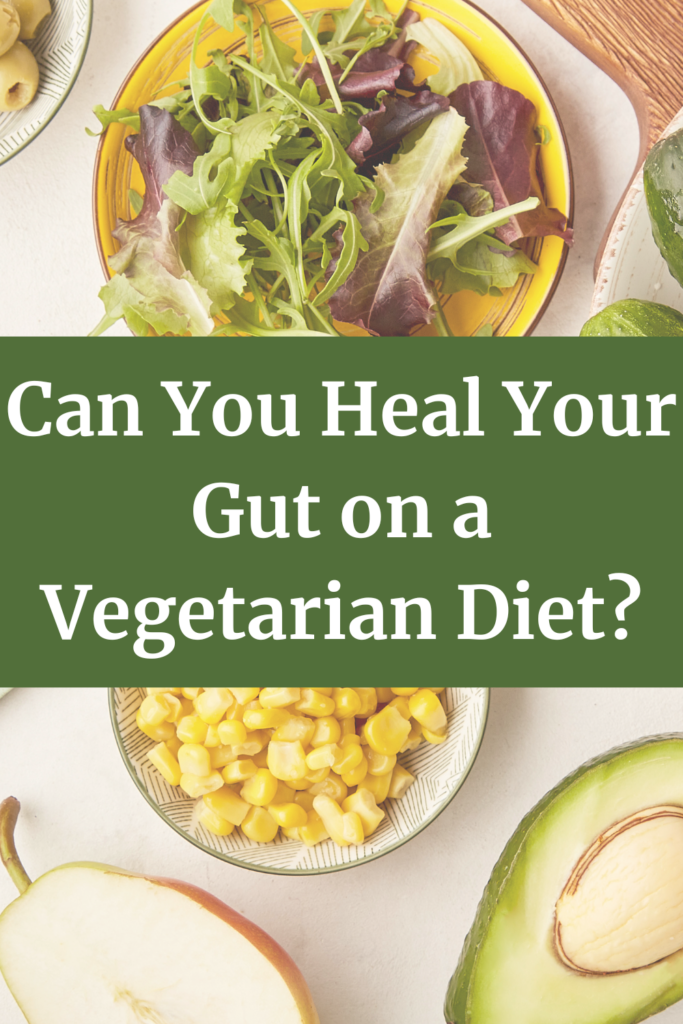
My desire for not wanting to live on meat autopilot anymore lead me to this place, to this question, and to seeking answer the answers to:
Can you heal your gut on a Vegetarian diet?
So, I asked my functional practitioner about it. And that day, besides the biggest conversation we would have around SIBO, this was my only other main question…..”Can I heal my gut on a Vegetarian diet?”
Dr. Schweig’s quick and dirty answer,
Yes, yes you can heal your gut on a Vegetarian diet as long as you keep mindful about nutrient density.
One of the first statements he made was that he was totally fine with me leaving red meat out, which actually made a ton of sense to me that he’d say that because he is a big fan of Dr. Sara Gottfried and in her book (I have it), The Hormone Reset Diet, there is an entire section and “reset” on going meat-free, which for her is mostly defined as red meat (because you can still have turkey, chicken, etc.)
He then went on to specifically call out three foods to focus on if I would be going more Vegetarian / following a whole food plant-based diet.
Here they are:
1. Beans
If you are shocked to hear that beans might be a good idea, know that I was just as shocked.
But he’s talking about properly prepared beans, not just canned garbanzo beans.
Wondering how you do that? I put together a list of 8 ways to properly prepare beans.
By properly preparing beans, you’ll give your digestive tract help with insuring reduction in unwanted side effects.
2. Sardines
Oh for the love, back to these.
I have done it, and I can do it, but it’s still a huge feat for me to get them down.
I needed to figure out more recipes in order to really incorporate them.
The first stop, though, was to grab them from a brand I trust, Wild Planet.
If you want to listen to an incredible podcast episode about them + salmon, check THIS out. (It all comes down to super high-quality healthy fats, which is definitely part of an optimal plant-based diet.)
3. Fish (in general)
Dr. Schweig especially pointed out salmon.
Again, if you’re interested in learning all things sardines and salmon, refer to the podcast I linked to above.
I told him these following foods/categories of foods I wanted to mostly focus on:
- fish
- vegetables
- some fruit
- eggs
- fats (avocado, coconut oil, other oils)
- nuts and seeds
- fermented foods
He said that was fine (with the exception of the diet protocol I have to follow for probably the next few months), but asked if I could throw in some high-quality, organic chicken from time-to-time.
I agreed, and I also said that if I was able to find other high quality, organic meat, I would be open to that as well.
Note: I DID find that. We now get local, organic beef and chicken + I discovered Wild Pastures which is (in my opinion) the best place online for delicious, nutrient-dense, 100% grass fed and pasture-raised meats at the lowest prices. Read all about them HERE.
I am not entirely certain where this is going to lead me, but I do know that right now it feels right.
And not only does it feel right, but I’ve been enjoying a new-ish spin to the daily eats.
Yesterday I had:
- eggs
- a smoothie (because remember, it’s smoothie week!)
- a lot of vegetables (green beans, mushrooms, arugula, leafy greens, kale)
- coconut milk latte boosted with L-Glutamine + Collagen
- kombucha
- rice
- banana
- salmon
- tuna
- nut butter
- sunflower and flaxseeds (but that’s really for seed cycling, which I do daily)
- coconut oil
I covered most of Dr. Schweig’s recommendations, and quite honestly, I felt fantastic all day long.
Conclusion on a Healthier Diet through Plant-Based Eating
Throughout this website, I have covered almost every single diet out there for healing the gut.
Everything from the mediterranean diet to a high-fiber diet; GAPS diet to the Elimination Diet.
I address different diets as they relate to inflammatory bowel disease, irritable bowel syndrome (namely, SIBO), autoimmune diseases, and even the general opinion (and the secret) for an optimal human gut microbiome.
And here is what I know for certain:
- Gut health and gut healing are two very different things. And prior to engaging with any sort of dietary change you must know where you stand.
- There is nothing wrong with an animal-based diet, though staunch Vegans will try to proclaim otherwise.
- Plant-based diets are where it’s at for the large intestine!
- Energy levels will soar when you do just ONE THING – DITCH PROCESSED FOODS.
- The standard western diet is the worst option.
- Plant-based diets AND animal-based ones have more in common than people realize.
The very best thing YOU can do is know yourself, where you currently stand, and through trial-and-error see what’s working best for you!
2 Steps to Understanding the Best Gut Healing Diet for You
In order to understand how long does it take for your gut to adjust to a plant-based diet, you can follow these 2 steps to understanding your own body better.
1. Choose whatever you think (or you’ve been recommended to follow) is going to be the best gut healing diet.
Go all in on it for at least 2 – 3 weeks. (I honestly think more like 30 days. However, if, after 21 days you are not seeing any progress in any way, it might truly not be for you. i.e. strict Vegan or Keto) Stay consistent. Follow the book, guide, plan, etc. as it is written for the best chance at understanding if it’s right for you.
Alternatively, you don’t have to cut things cold turkey. If you’re concerned about an unwanted side effect, then go slowly.
But maybe more important than this step is the next….
2. Get a journal to track it all so that you understand how that specific protocol is working for you.
Yes, you can chicken-scratch your way through it or even try to create your own gut healing journal with my free Bullet Journal tutorial.
Or, you can grab the essential gut healing SYSTEM I’ve been creating now for a decade+, with everything spelled out for you, ready to hit the ground running.
By using a tried-and-true gut healing journaling SYSTEM you will be far more likely to succeed because you will understand the effects of plant-based diets (or animal-based ones for that matter) on your own health.
The use of a journal played a significant role in having me arrive to a place where I knew exactly which foods were behooving my journey and which ones I needed to take out.
It’s the best way to PERSONALIZE your diet and lifestyle.
So what do you think? Can you heal your gut on a Vegetarian diet? What is the best diet for your own digestive health?
If you liked this article, you might also enjoy:
- GI Tract
- Good Bacteria (How to Starve Bad Bacteria)
- Whole Foods (12 Foods that Double as Medicine)
Disclosure: All opinions started here are 100% my own. I appreciate your support, as this compensation helps with expenses to keep this website up and running, and for me to continue sharing all that I can with you. Some of the links in this post are affiliate links. This means if you click on the link and purchase the item, I may receive a small commission at no extra cost to you.
Xox,
SKH
🤰 bloating be gone! weight loss through optimal gut health for women
💃ʜᴇᴀʟ ʏᴏᴜʀ ɢᴜᴛ. ʜᴇᴀʟ ʏᴏᴜʀ ʟɪfe.
🫶🏻 founder gutbyome.com



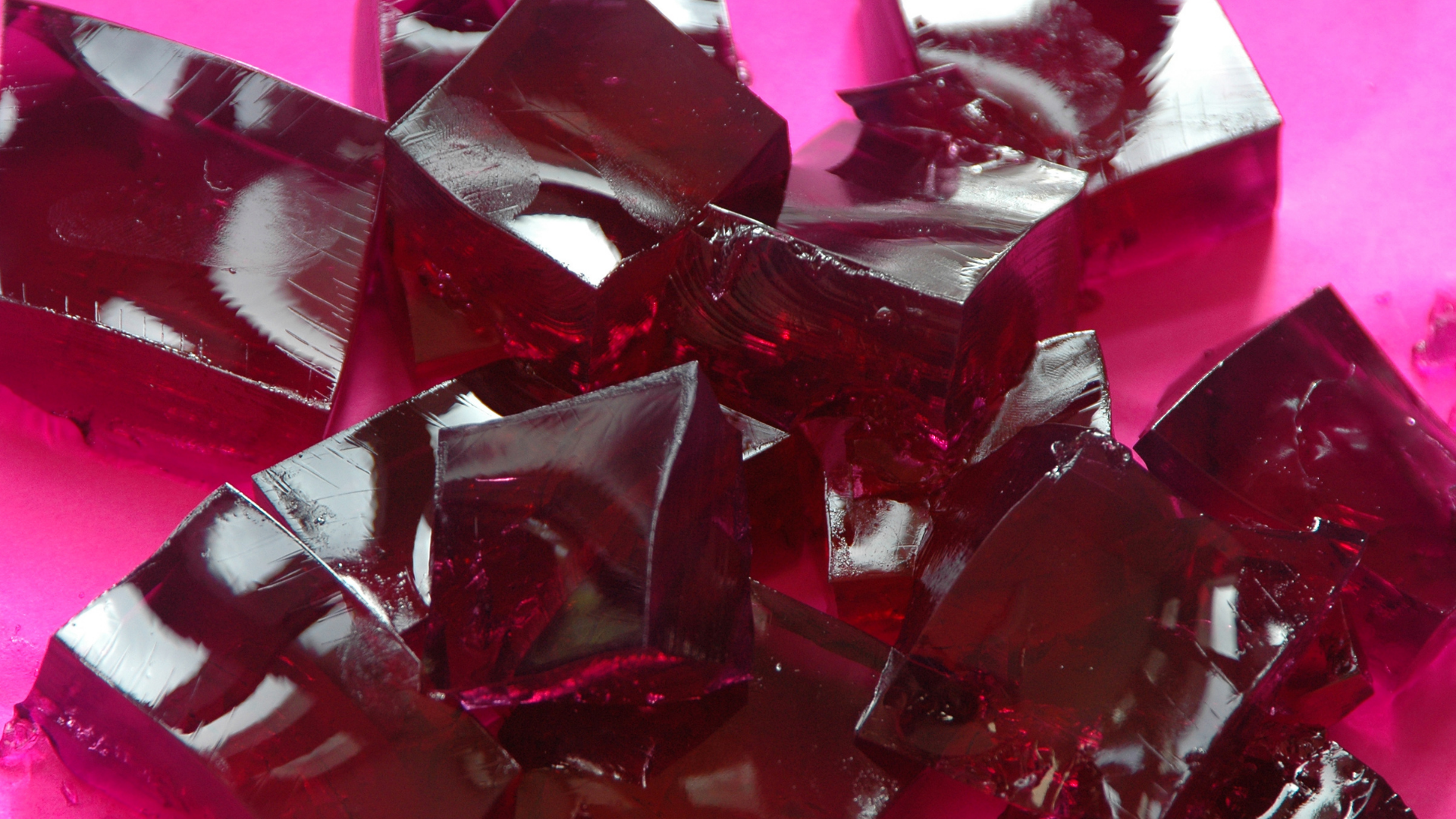

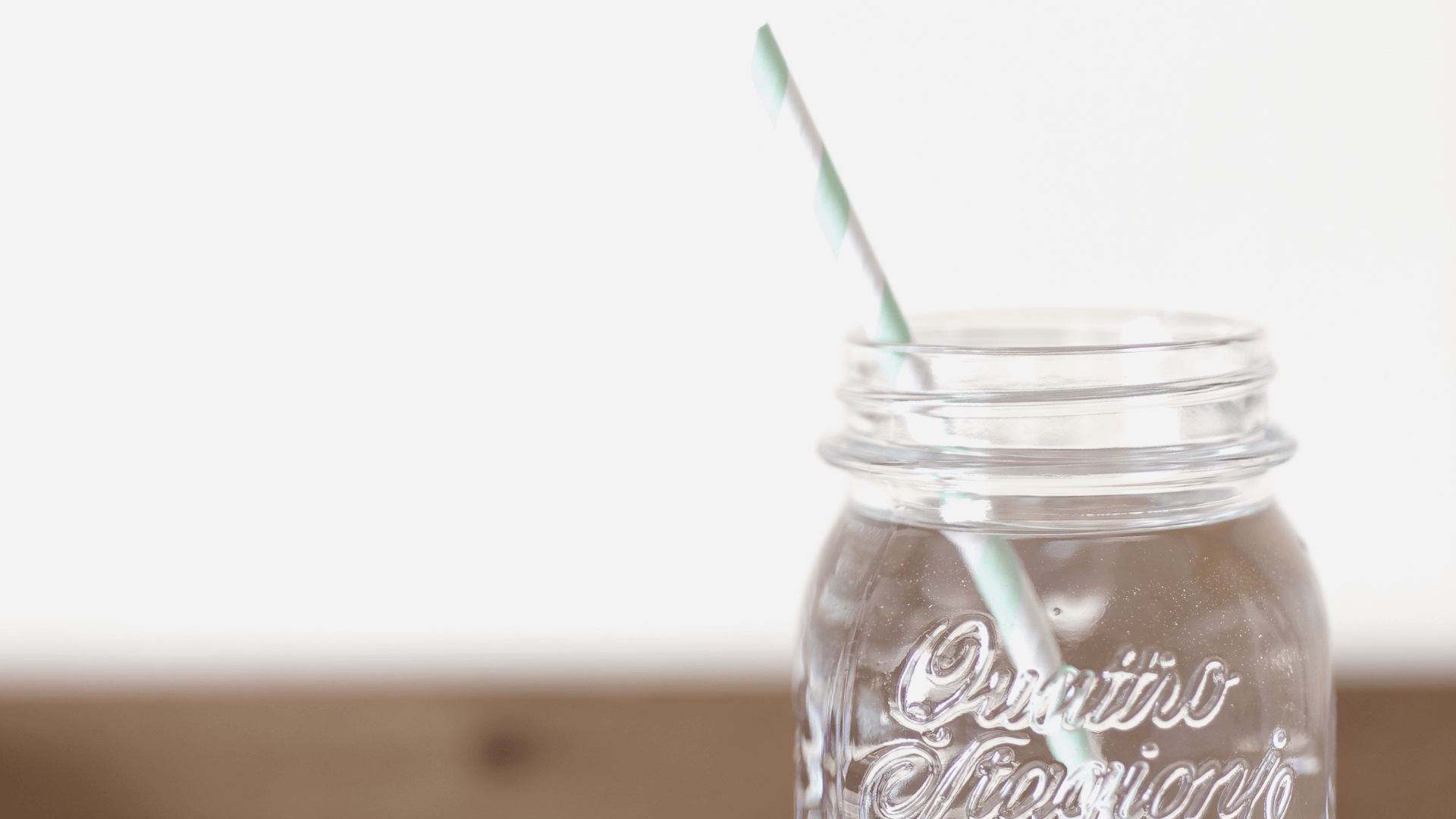
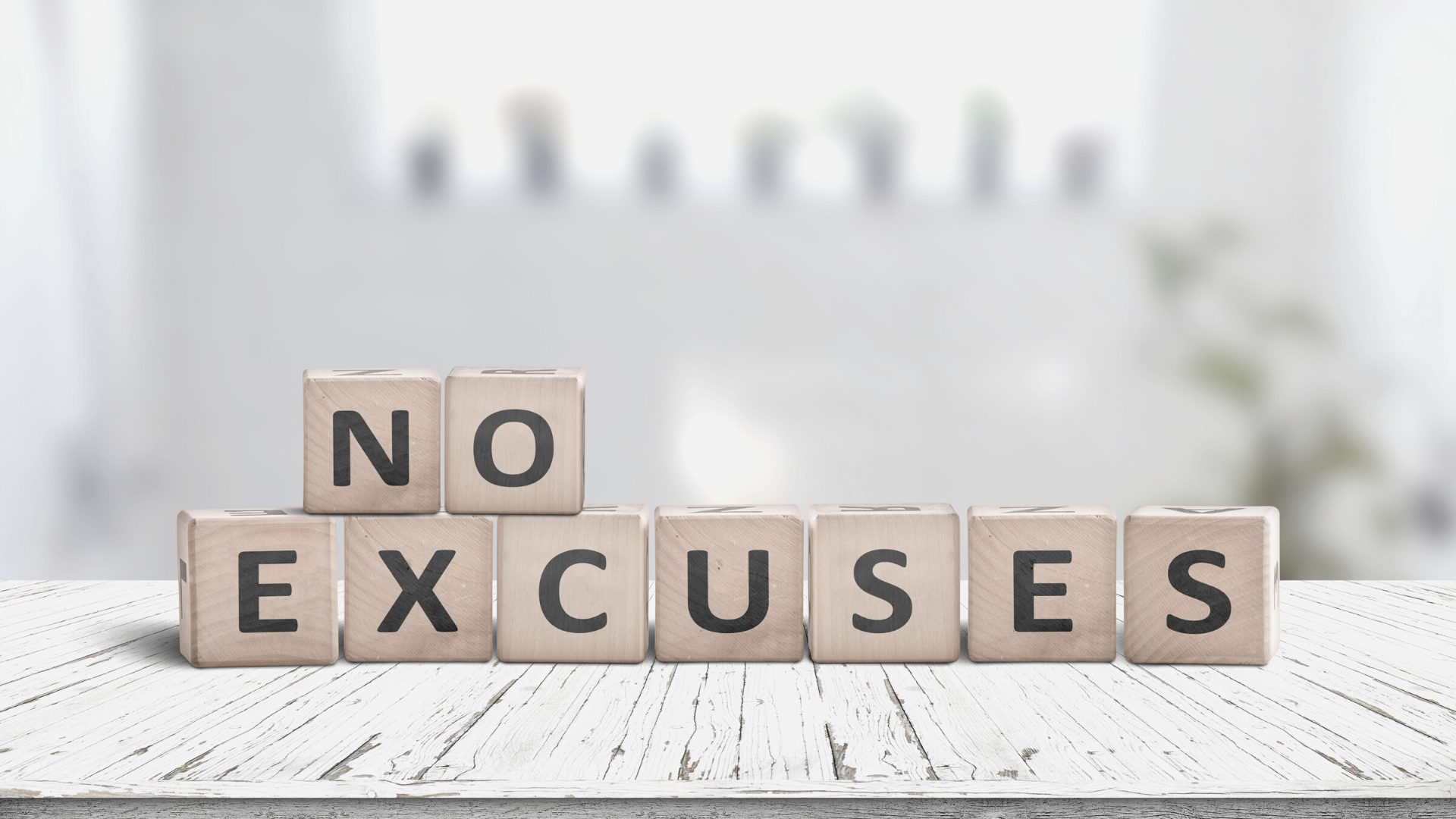
I was so excited to see this post! I was vegetarian for a while due to low stomach acid issues, but I started incorporating meat again a few years ago. The majority of our red meat and all pork we eat (with the exception of Applegate Farms bacon) comes from a local farm I 100% trust (Yonder Way Farm). But we started buying organic or “natural” meat and chicken at the grocery store sometimes to save money, and recently I’ve wondered if it’s really worth it to even eat that meat. So we’re back to all of our red meat coming from Yonder Way, and we just don’t have it often (maybe once a week), and we’ll also eat organic chicken from the Costco around once a week. But if I’m honest, vegetarianism still appeals to me the most! I haven’t eaten beans in years, so I’ll have to look at your preparation post. Anyway, all that to say, thank you for this post. It’s refreshing to know that we don’t have to eat ALL the meat to be healthy!
Thank you, Brooke! Yes, that’s my plan….to try to get back to enjoying meat, but maybe just like once a week – super high quality. I’m glad you enjoyed the post, and I’m looking forward to sharing more as I explore.
Sarah-BTW, I’m a CA girl living in Elk Grove so I know where Tracy is. 🙂 I am so interested in this post. I have preferred to eat vegan over the past few years simply bc I just don’t like the “thought” of what I am eating when I eat animal products. And in doing so I have wondered if I am doing my gut good. I have recently been thinking of adding fish back in. Maybe eggs. Your list of what you ate yesterday suits me as well as I love all of those same things. I’m encouraged by hearing the response of your Dr. Not sure about the sardines, though. Ha!
<3 Carolyn
P.S. I cant even deal with your story about the dog on FB. Heart crushing, for sure!
Hi Carolyn – Thanks for stopping by. I agree with you on all. But yes, I will be eating both fish and eggs 🙂
Sarah- so interesting! My transplant medications make me have horrible food aversions, so it has been very difficult for me to eat how I think I “should” be eating for gut healing. I’m definitely going to be following along – I’ve been leaning more towards vegetarianism because I can’t stomach meat anymore. Thanks for this!
Hi! You are most welcome! I’m SO excited to keep on keepin’ on with the exploration of it. xox
I love this post! Eating paleo has been the biggest heartbreak of having SIBO for me. I would love this if it was possible!
I think it IS possible, if done correctly. I’m on a mission 🙂
Food for thought… I had eaten paleo, AIP, etc.. for several years to heal my gut (with a very similar story as Sarah’s). I was better but no where near 100% which I didn’t understand considering how disciplined I was. It wasn’t until that I switched to the Blood Type Diet that I finally made the leap closer to full health. My type (Type A) does much better on a vegetarian diet. The most common blood type (Type O) does better on a paleo-ish diet, though. I know, I know…another “diet”. If it weren’t for the change i saw and felt within 5 days I wouldn’t even mention it. Everything cleared up and energy increased once I changed to a vegetarian diet. Beans and soy still make me bloated and gassy no matter how I prepare them. I learned it’s important to listen to your body and let that guide my lifestyle which may override my heart/beliefs because they are not serving my physical being well. Good luck on your continued journey.
Thank you, Kristen! And what’s funny about that is that I am Type O. Ugh. It’s true. I’m finding that I do better with meat, but I’m fighting with it 🙂
Hello. Thank you for your article. How have things been going? Have you been able to heal on a mostly plant-based diet?
Hi Gloria – I have a follow up to this post coming this week. Watch for it –> “The Kind Diet with SIBO.” Thanks for reading. Xox
I struggles, so much, emotionally and philosophically with eating meat. I love animals, but every time I’ve tried to be vegan or vegetarian, I get tired. My son, 16, has some digestive issues, and he has an ADHD diagnosis and is close to getting an level 1 autism diagnosis. I have Hashimoto’s thyroiditis. We both deal with depression, as well. What I want to do is quickly get through the intro. phases of GAPS, and then live on the full GAPS. It is my understanding that you can be close to vegan on the full GAPS, similar to what you’ve suggested. Thank you so much for the post! I’m not going to sign up for emails because I already get too much, but I will be coming back to your blog.
All my very best….
Thanx so muchfor this artikel! Vegetarian / vegan for 25 yrs and crashed in the en. (Bliodtype b). Realize the truth of gaps so have indeed tried. Googled efter trowing up again after tryin Fish 😰 only stuff i can seem to get down are a few Shrimp, canned tuna and bought poultry stock. So live on this, cooked veggies allowed dairy basicly. Seems impossible doin intro for me.. Need to keep my food down. So inspiring to read this!
Most welcome!
My day was great, until I read this post. Why would you retype the awful thing you saw on Facebook only to make everyone else who reads this want to kill themselves out of sickness, the same sickness you felt. Why? You ruined my day and I’m really upset you would even transfer that negative energy onto a platform like this and spread that horrible image. Shameful. Why? Please never do this again. I appreciate your information, although rice is horrible for you. But please be more respectful.
Because that’s life and the reality. I kept it PG compared to what I saw. I shared the story to emphasize a point. Also, rice is NOT HORRIBLE for you. Please stop spreading that fear.
So crazy that your question is about vegetarian diet for gut healing and the protocol you promote includes fish which is NOT vegetarian (pescatarian)
Seems to be a bit misleading
Hi Sue! Perhaps you didn’t read the full post or misunderstood. I know the differences between Vegetarian, Vegan, Pescatarian and so on. All I was saying was that my doctor thought I could lean in **more** towards Vegetarian, but with the caveat of consuming fish sometimes. It was not a “this is a Vegetarian diet I’m following.” In the end, though, that did not work for me at the time.